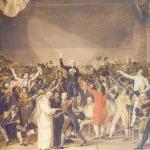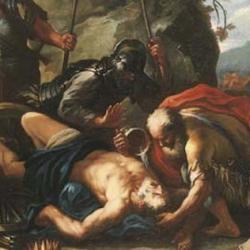Josiah’s death is a reverse exodus because it’s first an inverted Passover.
Zechariah describes a scene of mourning like the “mourning on the plain of Megiddo,” a reference to the death of Josiah (Zechariah 12:11). But the mourning Zechariah describes is also like the mourning of Egypt over their firstborn.
At the first Passover, the firstborn of Egypt died. Here, the firstborn of Israel, the king, dies. In fact, the king is Yahweh’s own son. In this reverse Passover, it’s Yahweh’s own son is slain.
Jeremiah laments (qonen) for Josiah as David lamented (qonen) at the death of Saul and Jonathan, and for the same reason. It’s not just for Josiah. It’s for “the king,” the king who acted most fully like a king, the king who is really the last king of Judah. The Davidic dynasty will limp along for a few more decades, but it’s effectively over. Like David, Jeremiah laments the end of a dynasty, the end of a kingdom.
Josiah is the last king to be buried in Jerusalem. His son Joahaz reigns for only three months, and then Neco puts his brother in his place. From then on the kings of Judah are puppets of one or another empire – either Egypt or Babylon.
Soon Judah will be conquered, the people deported, the temple and palace plundered and burned. The great Passover didn’t mark the beginning of a new deliverance for Judah. On the contrary, the great Passover was undermined by Josiah’s folly, his refusal to hear the word of Yahweh.
Jeremiah’s lament isn’t the lament in the book of Lamentations. That describes Jerusalem after the Babylonian deportations. But it might as well be: “How lonely sits the city, which was once so full of people. She has become like a widow.” After the death of Josiah, Jerusalem is indeed a widow, deprived of her royal husband, provider and protectors.
We think that history is smooth and predictable. Nations rise and then gradually decline. National decay is like slipping down a gentle slope. That’s not always the case. Sometimes nations collapse, precipitous. They don’t slowly slip down a gentle hill but fall off a cliff. That’s what happened to Judah: One day, she is at her height, and three months later she’s back in Egypt, back where she started.
We comfort ourselves with “It’s always darkest before dawn.” But sometimes the truth is: “It’s brightest just before all the lights go out.”
Yet in Chronicles, lament is not the last word. Lament is not the last song. Weeping lasts a night, but joy comes in the morning.
Judah descends to the grave of exile, but Chronicles ends with the decree of Cyrus. Yahweh is the living God who is faithful to death, and then again faithful. He is the living God who conquers death. The living God has bound Himself to Israel, freely and graciously bound His life to the life of Israel, and so Israel cannot stay dead. Judah’s king is His son and the throne of David is His throne. He won’t leave it in ruins.
The last word is not lament but the joy of return: “When the Lord turned again the captivity of Zion, we were like those who dreamed. Then was our mouth filled with laughter and our tongue with singing. Then said they among the heathen, The Lord has done great things for them. The Lord has done great things for us, whereof we are glad.”












